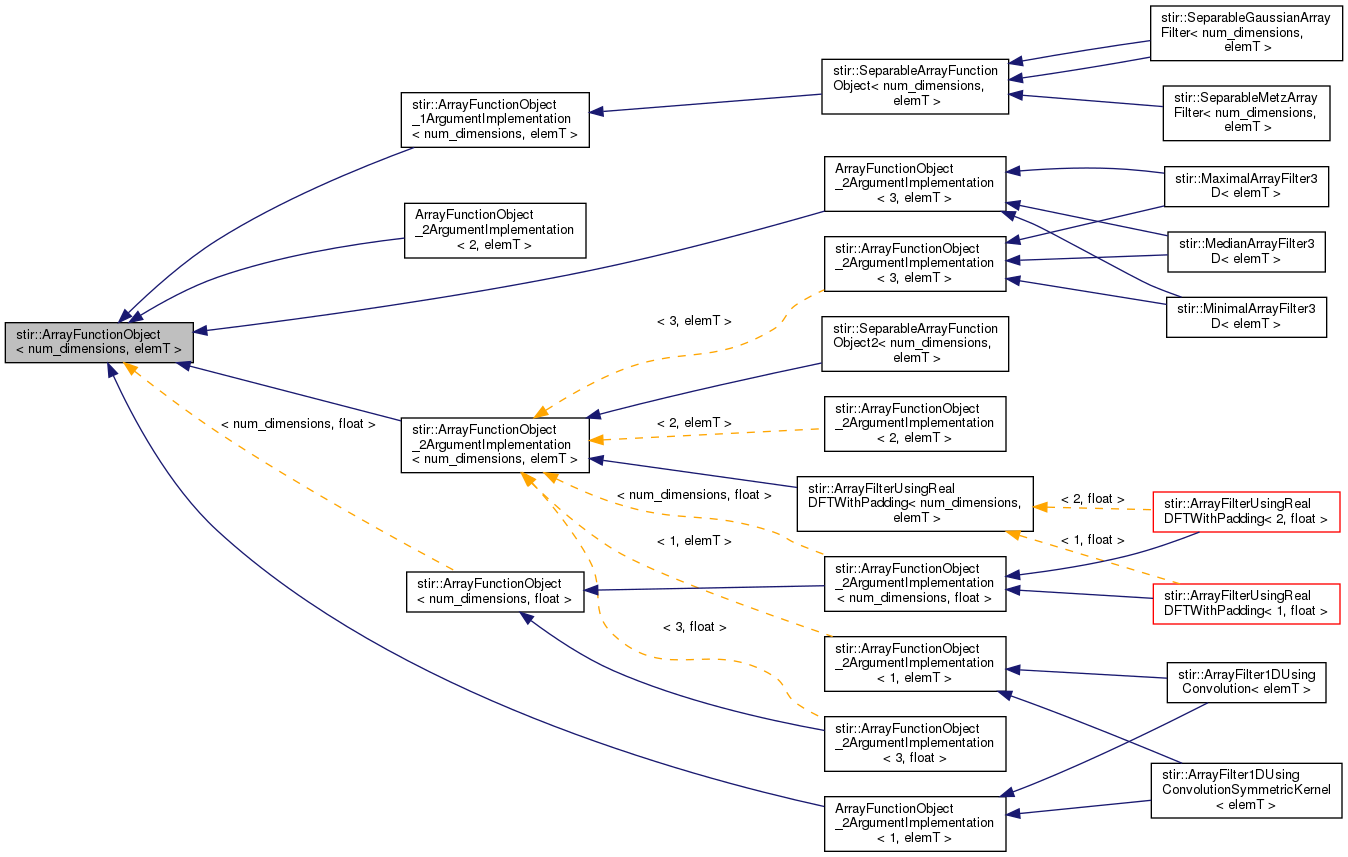A class for operations on n-dimensional Arrays. More...
#include "stir/ArrayFunctionObject.h"

Public Member Functions | |
| virtual void | operator() (Array< num_dimensions, elemT > &array) const =0 |
| in-place modification More... | |
| virtual void | operator() (Array< num_dimensions, elemT > &out_array, const Array< num_dimensions, elemT > &in_array) const =0 |
| result stored in another array More... | |
| virtual bool | is_trivial () const =0 |
| Should return true when the operations won't modify the object at all. More... | |
| virtual Succeeded | get_influencing_indices (IndexRange< num_dimensions > &influencing_indices, const IndexRange< num_dimensions > &output_indices) const |
| sets the range of indices that influences the result in a set of coordinates output_indices More... | |
| virtual Succeeded | get_influenced_indices (IndexRange< num_dimensions > &influenced_indices, const IndexRange< num_dimensions > &input_indices) const |
| sets the range of indices that gets influenced by a set of coordinate input_indices More... | |
Detailed Description
template<int num_dimensions, typename elemT>
class stir::ArrayFunctionObject< num_dimensions, elemT >
A class for operations on n-dimensional Arrays.
Member Function Documentation
◆ operator()() [1/2]
|
pure virtual |
in-place modification
- Warning
- Not all derived classes will be able to handle arbitrary index ranges for in_array.
Implemented in stir::ArrayFunctionObject_1ArgumentImplementation< num_dimensions, elemT >, stir::ArrayFunctionObject_2ArgumentImplementation< num_dimensions, elemT >, stir::ArrayFunctionObject_2ArgumentImplementation< 2, elemT >, stir::ArrayFunctionObject_2ArgumentImplementation< num_dimensions, float >, stir::ArrayFunctionObject_2ArgumentImplementation< 1, elemT >, stir::ArrayFunctionObject_2ArgumentImplementation< 3, float >, and stir::ArrayFunctionObject_2ArgumentImplementation< 3, elemT >.
◆ operator()() [2/2]
|
pure virtual |
result stored in another array
- Warning
- Not all derived classes will be able to handle arbitrary index ranges in out_array and in_array.
Implemented in stir::ArrayFunctionObject_2ArgumentImplementation< num_dimensions, elemT >, stir::ArrayFunctionObject_2ArgumentImplementation< 2, elemT >, stir::ArrayFunctionObject_2ArgumentImplementation< num_dimensions, float >, stir::ArrayFunctionObject_2ArgumentImplementation< 1, elemT >, stir::ArrayFunctionObject_2ArgumentImplementation< 3, float >, stir::ArrayFunctionObject_2ArgumentImplementation< 3, elemT >, and stir::ArrayFunctionObject_1ArgumentImplementation< num_dimensions, elemT >.
◆ is_trivial()
|
pure virtual |
Should return true when the operations won't modify the object at all.
For the 2 argument version, elements in out_array will be set to corresponding elements in in_array. Elements in out_array that do not occur in in_array will be set to 0.
Implemented in stir::ArrayFilterUsingRealDFTWithPadding< num_dimensions, elemT >, stir::ArrayFilterUsingRealDFTWithPadding< 1, float >, stir::ArrayFilterUsingRealDFTWithPadding< 2, float >, stir::ArrayFilter1DUsingConvolution< elemT >, stir::GammaArrayFilter2D< elemT >, stir::WienerArrayFilter2D< elemT >, stir::ArrayFilter1DUsingConvolutionSymmetricKernel< elemT >, stir::MedianArrayFilter3D< elemT >, stir::MinimalArrayFilter3D< elemT >, stir::MaximalArrayFilter3D< elemT >, stir::SeparableArrayFunctionObject< num_dimensions, elemT >, and stir::SeparableArrayFunctionObject2< num_dimensions, elemT >.
◆ get_influencing_indices()
|
inlinevirtual |
sets the range of indices that influences the result in a set of coordinates output_indices
For linear filters, these are the indices such that the support of their PSF overlaps with output_indices.
- Returns
- Succeeded::yes if this is a meaningful concept for the current object. Presumably, Succeeded::no would be returned if the whole array is always going to affect the output_indices (independent of the size of the input array) or of it is too difficult for the derived class to return a sensible index range.
◆ get_influenced_indices()
|
inlinevirtual |
sets the range of indices that gets influenced by a set of coordinate input_indices
For linear filters, this is the union of the supports of the PSF for all output_indices.
- Returns
- Succeeded::yes if this is a meaningful concept for the current object. Presumably, Succeeded::no would be returned if the whole array is always going to be affected by the input_indices (independent of the size of the output array) or of it is too difficult for the derived class to return a sensible index range.
The documentation for this class was generated from the following file:
- /home/sirfuser/devel/STIRdistrib/STIR/src/include/stir/ArrayFunctionObject.h
 1.8.13
1.8.13